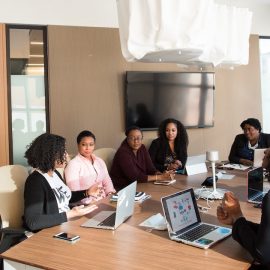

This article is an excerpt from the Shortform book guide to "Impact Players" by Liz Wiseman. Shortform has the world's best summaries and analyses of books you should be reading.
Like this article? Sign up for a free trial here.
What makes certain employees stand out while others remain in the shadows? How can you transform yourself into a high-value contributor at work?
Impact Players, a book by leadership expert Liz Wiseman, reveals the secrets of exceptional employees. Through extensive research with leaders from organizations such as Google and NASA, she found that becoming an impact player isn’t about natural talent but about adopting specific mindsets and habits.
Keep reading to learn the practical strategies that can help you multiply your value at work and accelerate your career growth.
Impact Players Book Overview
Have you ever wondered why some employees can have a big impact at work, while others who work just as hard struggle to stand out? Impact Players, a book by Liz Wiseman, refers to star employees as impact players—people who perform at their highest capacity and know how to make themselves valuable in their workplace. They look for the most productive ways to be of use, consistently deliver stellar results, and positively influence their entire team. Leaders estimate that such individuals contribute more than three times as much value as average contributors.
Wiseman conducted a study involving 170 leaders from global organizations like Google, NASA, and Adobe to identify the habits and mindsets that set impact players apart from average contributors. She found that many smart, talented individuals fall short of their potential simply because they don’t know how to better contribute. The good news is: By making small changes to your habits and mindset, you can become an impact player yourself, get more praise for your work, and make a bigger difference at your job.
Wiseman is a leadership expert and keynote speaker known for her research on workplace dynamics. She has written several books including the best seller Multipliers and The Multiplier Effect. Wiseman is also the CEO of The Wiseman Group, which provides leadership research and development.
In this overview, we’ll first explain the benefits of becoming an impact player at work. Next, we’ll look at the mindset that allows impact players to recognize and seize opportunities to be valuable. Then, we’ll explore five habits you can adopt to increase your impact. Lastly, we’ll look at some ways leaders can develop impact players within their team.
Why Should You Become an Impact Player?
Wiseman writes that becoming an impact player can be highly rewarding not only for your organization but also for your career: When leaders see the exceptional value you bring to the table, they invest more in your growth. Consequently, you’ll receive more rewards, greater access to mentorship opportunities, more exciting and challenging assignments, and a quicker advancement in your career.
Wiseman points out that the amount of your impact isn’t bound to your intelligence or talent. Many smart and talented people end up as average or even below-average contributors, failing to live up to their potential. To increase your impact, you must cultivate the right mindset and habits that make you more valuable at work.
The Impact Player Mindset
Wiseman argues that impact players adopt a mindset that allows them to see more opportunities to create value than average contributors. They embrace change, they consider the perspectives of others, and they don’t doubt themselves.
Let’s explore each of these shifts in thinking to help you adopt the mindset of an impact player.
Shift #1: See Change as an Opportunity
First, Wiseman writes that most workers see change as a threat to their jobs or self-esteem. They therefore avoid new responsibilities and unexpected challenges, which limits their ability to make valuable contributions to their organization.
In contrast, impact players approach change with an empowered mindset: They welcome change as an opportunity to grow and be valuable. This way of thinking allows them to competently navigate common workplace challenges like unexpected obstacles, changing goals, or excessive demands—challenges that average contributors struggle with.
To view change more positively, Wiseman suggests you use a process called cognitive reframing: First, recognize that situations can be seen in more than one way. Then, examine how you view a situation and evaluate whether your perspective stems from fear. Finally, try to reframe the situation: Are there positives you didn’t see before? Could this challenging time also be a chance for you to grow or improve? Regularly asking yourself these kinds of questions can gradually shift your perspective toward change.
Shift #2: See the Bigger Picture
Second, Wiseman contends that many professionals only view situations from their point of view. As a result, they exclusively focus on their individual work and fail to consider the needs of their team and their organization, which limits their impact.
Wiseman says that impact players, on the other hand, strive to look beyond themselves: They widen their perspective by being observant of their surroundings and trying to see things through other people’s eyes. In doing so, impact players often notice two things that average contributors miss:
1) Unspoken rules: Every organization has rules and expectations that aren’t stated explicitly but shape its culture and how it operates. These might include, for example, whether workers are expected to arrive early or stay late, or which employees tend to sway others’ opinions. By broadening your perspective and decoding these unspoken rules, you can identify the best ways to communicate with colleagues, align your actions with the organization’s expectations, and gain respect from your superiors.
2) What others value: Considering other people’s perspectives ensures that you don’t waste your efforts on things people don’t find helpful, but instead that you contribute to what your boss and coworkers need.
To hone your ability to see the bigger picture, Wiseman suggests you practice seeing others’ perspectives. Ask people how they see a situation and spend more time listening instead of rushing to share your thoughts. You can also put yourself in someone’s shoes by shadowing them or helping them with some of their responsibilities.
Shift #3: Believe You Can Make an Impact
Third, Wiseman writes that average contributors limit their impact by doubting themselves and what they can accomplish. By thinking they can’t contribute more value or handle difficult challenges, they don’t bother to look for hidden opportunities or think of creative ways to solve problems.
Impact players, on the other hand, believe in their ability to adapt to new challenges. This mindset encourages them to seize opportunities instead of fearing them, and to produce more valuable work.
Wiseman breaks down the four components of self-belief that impact players have:
- A strong sense of agency: Impact players recognize they have the power to take action and make decisions that can change and improve situations.
- An internal locus of control: Impact players believe they can influence events and their outcomes instead of being controlled by external circumstances like luck or fate.
- A growth mindset: Impact players firmly believe they can get better at what they do through hard work and learning, understanding that setbacks are just part of the process.
- A strong sense of self-worth: Impact players know that they are valuable. Importantly, their sense of self-worth isn’t tied to what other people think of them, which helps them accept feedback, change easily, and learn from mistakes.
The Five High-Impact Habits
Now that we’ve discussed the mindset of impact players, let’s look at ways to become one yourself. Based on her research, Wiseman lays out five key habits of impact players that help them reach their fullest potential, maximizing the benefits they bring to themselves and their organizations.
Habit #1: Find Ways to Be More Valuable
First, Wiseman writes that impact players actively look for ways they can be of more use. Specifically, they identify and do the most valuable work, even if it’s outside of their job description.
Wiseman contends that the most important work an organization needs done often spills beyond the boundaries of specific job roles. This is because, in today’s world, work has become more complex and fast-paced due to technology and globalization. She writes that most workers haven’t adapted to this change and restrict themselves to the responsibilities they’ve been assigned. Because of this, they may work just as hard as impact players but fail to make as much of an impact because they don’t get involved in the most critical tasks for their organization.
To make the greatest impact, you should not only look beyond your job title but also your personal interests. Wiseman writes that impact players develop a passion for the work they have to do instead of doing only what they’re personally passionate about. She argues that the belief that following your personal passions leads to happiness at work is flawed—passions evolve and aren’t things that can be discovered through introspection. Instead, adapt your motivations to the needs of the organization and learn to love the work you have to do. This way, you can make meaningful contributions to your company and feel proud of your accomplishments which, in the end, leads to greater feelings of satisfaction.
To identify the critical needs of your organization and get involved, Wiseman suggests the following steps:
1) Identify broader organizational goals. To enhance your impact, you should always be working on your organization’s top priorities. Wiseman writes that these priorities change frequently and aren’t usually broadcasted in obvious ways, so regularly reach out to your team and your superiors to stay in the loop. To decide which goal to address first, identify your superior’s top three priorities and your organization’s top three priorities. Then, find where they intersect. For instance, if both your boss and your organization view team skill development as a priority, you might decide to contribute to a project that focuses on this.
2) Determine how you can contribute. Reflect on how your distinct skills can contribute to higher-level goals. For example, if you’re tech-savvy, you might offer to improve a software tool for training new team members.
3) Share your plans. Wiseman suggests you write a brief statement about how you can help your superior and your organization achieve their priorities. Your superior will appreciate knowing how your contributions fit into larger goals and that you’ll continue to do your regular tasks well.
Habit #2: Take the Lead
According to Wiseman, another habit that increases impact is assuming informal leadership roles when necessary: Impact players take charge of issues that no one else handles and then step back once they’re resolved.
Wiseman writes that many workplaces have persistent minor problems that everyone complains about but no one addresses. These problems often go unresolved because they’re seen as irritating but not urgent enough to devote effort to. Wiseman argues that although these problems are easy to disregard, they disrupt the productivity and effectiveness of your team over time. For example, disorganized documents can cost your team valuable time looking for and accessing information.
To boost your impact, says Wiseman, look for situations where leadership is absent and where you can step in and make a positive difference. Once you identify an unresolved issue, gather a team to resolve it. This means you’ll lead a team but without a formal title. To do this effectively, Wiseman recommends you:
1) Ask for your coworkers’ support. Clearly state the problem so that everyone’s on the same page, express your goal, and explain how achieving it will help everyone. Work on building trust and good relationships with your coworkers so they’ll be likely to support you when needed.
2) Adopt good leadership traits. Look at the values of your boss or organization and strive to incorporate them so people will respect and follow you.
3) Respect people’s time and effort. When you enlist people’s help, make sure you use it wisely. People will be more enthusiastic to join you if they trust that you won’t waste their time and energy.
4) Share the credit. Once your team has solved the problem, step down and encourage others to take the lead when needed. This approach will boost everyone’s confidence, encourage more people to take initiative, and enhance your impact and the team’s ongoing success.
Habit #3: Embrace Feedback
Wiseman writes that impact players look for feedback instead of praise. They recognize that feedback isn’t a personal attack but a way to help them improve. In contrast, non-impact players avoid or ignore feedback because it hurts their ego. Instead, they only seek out and listen to validation. However, it’s feedback—not praise—that can help you adjust and correct your actions, so when workers ignore feedback, they stop growing and improving, and thus they limit their potential.
Wiseman argues that prioritizing validation over guidance leads to impact-reducing behaviors. It can cause you to stick only to your strengths and to not try to improve weaknesses. Additionally, you may check in too frequently with your manager to get validation for your work to the point where it becomes burdensome for them.
Wiseman suggests several ways you can view feedback in a more positive light:
1) Separate your work from your sense of self. Recognize that your work doesn’t define your value as an individual. For example, making a mistake on a task doesn’t make you a failure.
2) Gain some distance from it. If you’re finding it hard to accept some feedback, take a break—for example, go for a walk. This gives you space to calm your emotions and helps you open your mind to making changes.
3) Make small changes to your behavior. Try to implement one piece of feedback at a time because small changes are easier to make, and they can have a big impact. When you make these changes, communicate your progress: Let your manager or your mentors know how their feedback has helped you and what you’ve achieved as a result. Doing so encourages people to continue investing in you.
Habit #4: Finish What You Start
Wiseman argues that another key habit of impact players is that they take ownership of their work and see it to completion, regardless of challenges that come up along the way. Managers can rely on these workers to deliver consistent, quality results without needing constant reminders or supervision.
Wiseman explains that when challenges arise, most workers tend to avoid or deflect them. They alert others about the issue so that someone else can handle it. Impact players, on the other hand, stick with the task and tackle the problems themselves. Wiseman identifies two characteristics that help impact players to face these unexpected challenges head-on: resilience (the ability to recover from setbacks) and grit (the determination to do the work necessary to reach a goal).
To prepare yourself to handle unexpected challenges, Wiseman suggests several strategies:
1) Recruit a lookout. Ask a coworker to keep an eye on any weaknesses or potential threats you may face as you work. Getting a different perspective can help you anticipate potential challenges on the horizon. At the same time, be willing to do the same for them. By preparing for possible problems, you can focus all your effort on finding prompt, innovative solutions.
2) Ask for what you need. Anticipate possible obstacles early and clearly communicate to your boss and your team what you’ll need for success from the very beginning. This way, you secure the resources and support to overcome challenges before they arise.
3) Know when to let go. Regularly assess the pros and cons of continuing with a task, recognize when a project is draining more resources and energy than it’s worth, and have the courage to let it go.
Habit #5: Make Work Easier for Others
Wiseman writes that impact players understand they’re part of a team, not just individuals working alone, so they strive to make work better for everyone. In contrast, low-impact workers often add a burden to their teammates. They may do this unknowingly, by, for example, being overly negative or asking for help but rarely offering it.
When you make work easier for others, you’re seen as a more valuable contributor. Wiseman suggests you create a more positive workplace by doing the following.
1) Being low maintenance. Be easy to work with and avoid getting involved in office drama and other burdensome behaviors like wasting people’s time, complaining, or trying to show off. Wiseman suggests you be selective about your contributions—double check that your ideas are important, unique, and evidence-based ideas before sharing them.
2) Lessening the workload. Be willing to help others when needed, resolve conflicts instead of initiating them, and try to make tasks simpler for others. To do this, Wiseman suggests you learn what your natural strengths are and use them to improve everyone’s work experience. For example, if you have strong communication skills, you can use them to promote open dialogue and collaboration within the team.
3) Making things fun. Make the workspace a nice place to be in by using humor and appreciating others. Bringing more positivity to work strengthens the team’s relationships, boosts engagement, and makes people more resilient to challenges.
How to Build a Team of Impact Players
Now that we’ve discussed the mindsets and habits that help workers make the greatest impact in their organization, let’s explore ways leaders can nurture a team of impact players. To create a high-impact team, you must create an environment where people feel safe to try new things and stretch their capabilities.
Wiseman describes a couple of ways leaders can foster a high-impact team:
1) Be clear about top priorities: Team members may want to contribute more, but they may not know what’s valuable to the team and the organization. Telling your team what’s most important helps them put their time and effort into the right tasks.
2) Encourage flexible leadership: Encourage people to take initiative when needed and to provide support when their coworkers lead.
3) Ask for commitment: Encourage team members to take responsibility for their work and to persevere until it’s finished.
4) Focus feedback on the work, not the person: Feedback should help your team improve, not feel attacked. This way, team members can acknowledge and work on their weaknesses without feeling insecure.
5) Praise good work and behavior: Recognize team members who set a great example. Highlighting positive actions helps people see ways to contribute value that they may not have realized before and encourages everyone to do better.
6) Make sure everyone on your team feels valued. Help every team member feel like their contributions are seen and appreciated, no matter their role. When people feel valued, they look for more ways to contribute value. Make a special effort to listen to team members who aren’t usually in the spotlight or who might not speak up.

———End of Preview———
Like what you just read? Read the rest of the world's best book summary and analysis of Liz Wiseman's "Impact Players" at Shortform.
Here's what you'll find in our full Impact Players summary:
- How to become a star player at your workplace
- The three qualities of an impact player mindset
- Advice for creating an entire team of impactful employees






